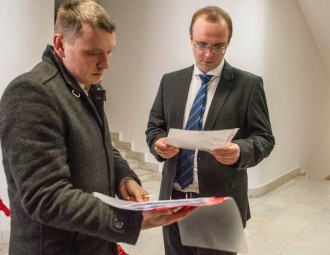Belsat tries to get official accreditation in Belarus
 belsat.eu
belsat.eu
The TV channel has filed a required set of documents to the Ministry of Foreign Affairs on March 21.
“This time, we have applied for the accreditation of individual correspondents and cameramen, not for that of a news bureau, as was formerly the case. All the documents filed meet the requirements, and there is no formal reason for denial,” commented Aliaksei Minchonak, the channel’s official representative in Belarus.
Earlier the TV channel has been trice denied accreditation of news office in Minsk. The Belarusian Foreign Ministry declared that it could not issue any accreditation to Belsat TV because the journalists working for it … break the law. So the circle closes: journalists are denied accreditation because they break the law and they break the law, because they work without accreditation that they seek.
Belsat TV has been working since 2007 and was established as a joint project of the MFA of Poland and the Polish Public Television TVP, but its editorial policy is entirely independent.
-
03.01
-
07.10
-
22.09
-
17.08
-
12.08
-
30.09



























